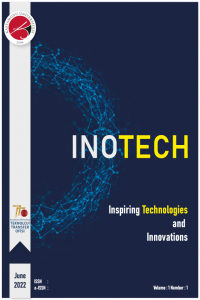The Relationship of Energy Management and Environmental Innovation: A Conceptual Evaluation
The Relationship of Energy Management and Environmental Innovation: A Conceptual Evaluation
Global warming and climate change are currently the most pressing challenges in the globe. Environmental pollution, greenhouse gas emissions, and wastes produced by the industrial sector at various stages of the production and consumption processes are the main contributors to this. As a result of additional harm to natural resources and the erosion of the balance, nations, corporations, and consumers face the possibility of not having a clean world where they can thrive and leave a legacy to future generations. It is necessary to develop R&D activities that support the recycling of natural resources, clean production and zero waste philosophy, technological advancement towards the use of renewable energy resources, and innovation in processes and operations in order to develop environmentally friendly production methods. This paper aims to analyze the connections between the ideas of energy management and eco-innovation and to explain their importance. The idea of energy management, the rise of environmental awareness concurrent with energy management, issues relating to energy use, and the connection between eco-innovation, energy management, and environmental are all addressed within this framework.
Keywords:
Energy Management Energy Efficiency, Energy Saving, Eco-Innovation,
___
- 1. Akintande, O.J., Olubusoye, O.E., Adenikinju, A.F. ve Olanrewaju, B.T. (2020). Modeling the determinants of renewable energy consumption: Evidence from the five most populous nations in Africa. Energy, 206, 1-11
- 2. Bartlett D., Trifilova A. (2010). Green technology and eco-innovation: Seven case-studies from a Russian manufacturing context. Journal of Manufacturing Technology Management. 21(8), 910-929.
- 3. Carrillo J., González R., Könnölä T., (2010). Eco-innovation: when sustainability and competitiveness shake hands. Palgrave Macmillan, 8.
- 4. Fiedler T. & Mircea P. M. (2012). Energy Management Systems According To The Iso 50001 Standard — Challenges And Benefits. Paper Presented at the International Conference on Applied and Theoretical Electricity (ICATE), Craiova, Romania.
- 5. Ghosh, S. (2002). Electricity Consumption and Economic Growth in India, Energy Policies, 30, 125-129.
- 6. Harris, M. C. (2001). The globalization of energy markets. Challenges of the Global Century, Washington, DC: National Defense University. 271-282.
- 7. Hemmelskamp, J. (1997). Environmental policy instruments and their effects on innovation. European Planning Studies, 5(2), 178.
- 8. Introna, V., Cesarotti, V., Benedetti, M., Biagiotti, S., & Rotunno, R. (2014). Energy Management Maturity Model: An Organizational Tool to Foster the Continuous Reduction of Energy Consumption in Companies. Journal of Cleaner Production, 83, 108-117.
- 9. Janahi, N. A., Durugbo, C. M., & Al-Jayyousi, O. R. (2021). Eco-innovation strategy in manufacturing: A systematic review. Cleaner Engineering and Technology, 5, 100343.
- 10. Kannan, R., & Boie, W. (2003). Energy management practices in SME––case study of a bakery in Germany. Energy conversion and management, 44(6), 945-959.
- 11. Karadaş, H. A., Koşaroğlu, Ş. M., & Salihoğlu, E. (2017). Enerji tüketimi ve ekonomik büyüme. Cumhuriyet Üniversitesi İktisadi ve İdari Bilimler Dergisi, 18(1), 129-141.
- 12. Karagöl, E. T., Özgür, Ö., & Görüş, M. Ş. (2020). Gelişmiş ve Gelişmekte Olan Ülkelerde Standart Makroekonomik Analiz: Ampirik Bir Uygulama. Paper In International Congress of Management, Economy and Policy ICOMEP’20.116-123.
- 13. Khan, A., Chenggang, Y., Hussain, J. ve Kui, Z. (2021). Impact of technological innovation, financial development and foreign direct investment on renewable energy, non-renewable energy and the environment in Belt & Road Initiative countries. Renewable Energy, 171, 479-491.
- 14. Korotenko, V. (2018, May). The Phenomenon of Ecological Consciousness: Theory and Interpretation. In Proceedings of the XXIII World Congress of Philosophy (Vol. 11, pp. 71-76).
- 15. Kuo, T. C., & Smith, S. (2018). A systematic review of technologies involving eco-innovation for enterprises moving towards sustainability. Journal of Cleaner Production, 192, 207-220.
- 16. Kurbatov, V. L., & Naumenko, S. M. (2014). Globalization of energy saving problems and identifying of the ways of solving them in investment-building complex. Life Science Journal, 11(8), 553-557.
- 17. Lee, S.K., Teng, M.C., Fan K.S., Yang, K.H. & Horng, R. S. (2011). Application of an Energy Management System in Combination with FMCS to High Energy Consuming IT Industries of Taiwan. Energy Conversion and Management, 52, (8-9), 3060-3070.
- 18. Lin, S. T., & Niu, H. J. (2018). Green consumption: Environmental Knowledge, Environmental Consciousness, Social Norms, and Purchasing Behavior. Business Strategy and the Environment, 27(8), 1679-1688.
- 19. OECD (2009). Sustainable Manufacturing and Eco-Innovation: Framework, Practices and Measurement. Synthesis Report, 19.
- 20. Rennings K. (2000). Redefining innovation—eco-innovation research and the contribution from ecological economics. Ecological economics, 32(2), 323.
- 21. Ruzzier H. (2016). What drives eco-innovation? A review of an emerging literature. Environmental Innovation and Societal Transitions, 19, 32. Hellström, T. (2007). Dimensions of environmentally sustainable innovation: the structure of eco innovation concepts. Sustainable development, 15(3), 148-159.
- 22. Schiederig T., Tietze F., and Herstatt C. (2012). Green innovation in technology and innovation management–an exploratory literature review. R&d Management. 42(2), 190.
- 23. Tıraş, H. H. (2012). Sürdürülebilir kalkınma ve çevre: teorik bir inceleme. Kahramanmaraş Sütçü İmam Üniversitesi İktisadi ve İdari Bilimler Fakültesi Dergisi, 2(2), 57-73.
- 24. Topal, A., & Özoğlu, B. (2018). Enerji Verimliliği ve Enerji Tasarrufunun Sürdürülebilir Tüketim Perspektifinden Değerlendirilmesi. ICPESS 2018 PROCEEDINGS Volume 2: Economic Studies, 32.
- 25. TUBİTAK, (1997). Türkiye’nin Bilim ve Teknoloji Politikası Bilim ve Teknoloji Yüksek Kurul 3. Toplantısı. TUBİTAK, BTB 97/04.
- 26. Wang, Q. ve Wang, L. (2020). Renewable energy consumption and economic growth in OECD countries: A nonlinear panel data analysis. Energy, 207, 1-11.
- Yayın Aralığı: Yılda 2 Sayı
- Başlangıç: 2021
- Yayıncı: Kastamonu Üniversitesi
